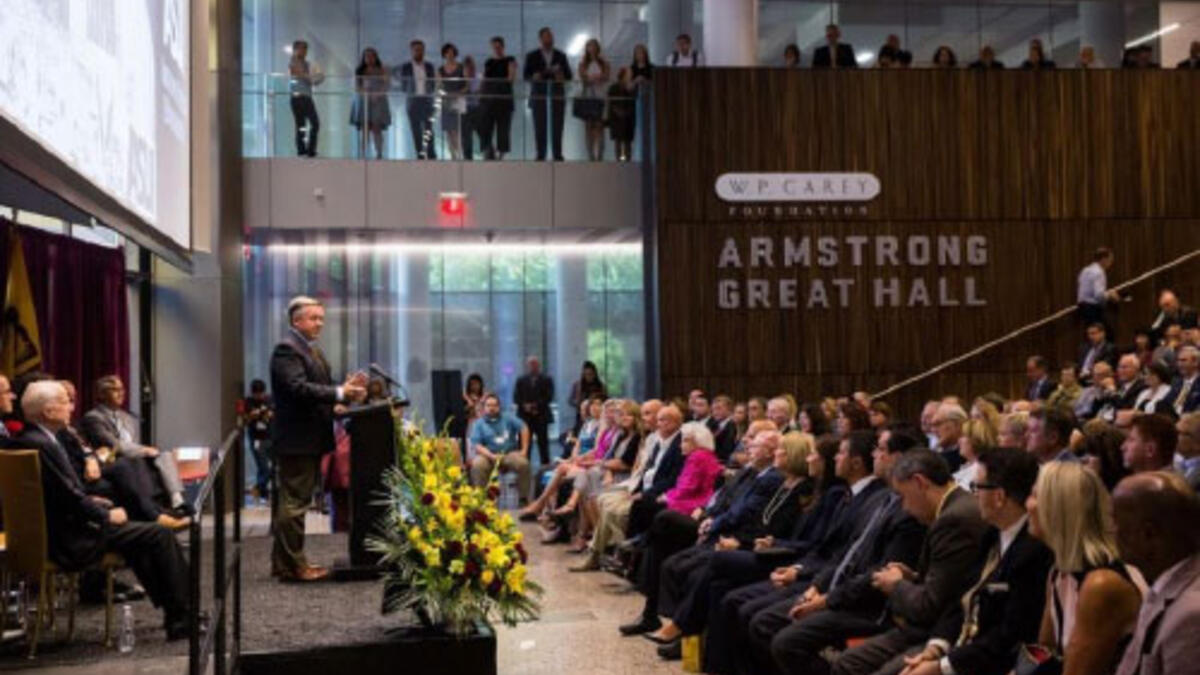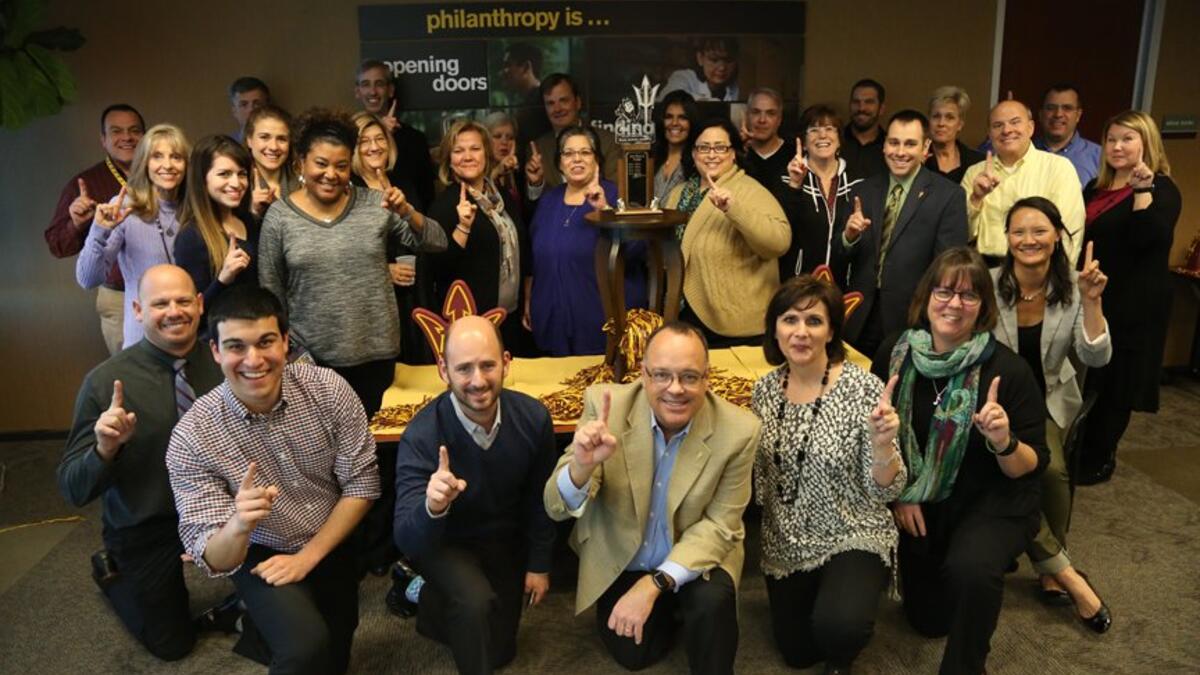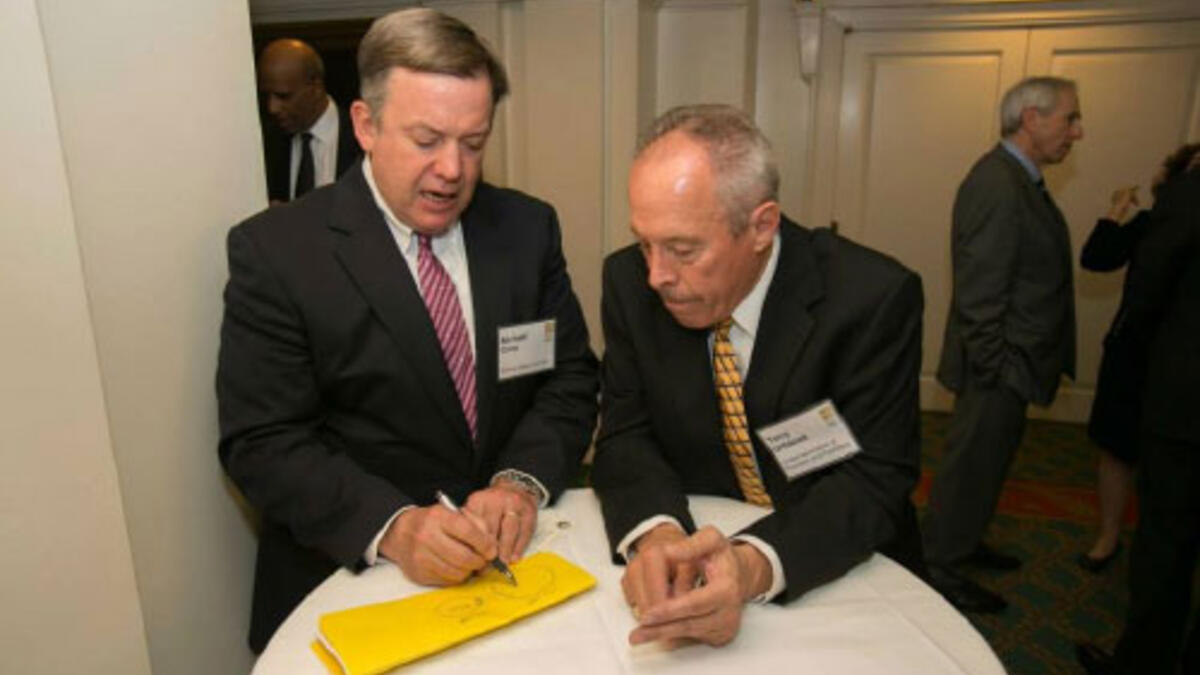
Updates from the President
Updates from President Crow: September 1, 2016
- ASU Welcomes Largest, Most Diverse Freshman Class
- Beus Center for Law and Society Opens in Downtown Phoenix
- ASU Enterprise Partners: A Revolutionary Model for Support
- Helping Guide Innovation with the Council on Competitiveness

2016 Fall Student Welcome in Wells Fargo Arena
ASU welcomes largest, most diverse freshman class
There was no more exciting way to kick-off the new academic year at ASU than by welcoming the Class of 2020 to our Tempe campus. Every year, as part of ASU Fall Welcome, we host the Sun Devil Welcome, a celebration in Wells Fargo Arena that gives our freshmen a chance to get to know the college/school peers, learn ASU traditions and exercise their impressive Sun Devil spirit.
This year, I had the pleasure of greeting more than 11,500 new Sun Devils from all 50 U.S. states and 74 countries - the largest and most diverse freshman class in ASU history. In addition, more than 60% of the class is comprised of students from Arizona and 50% of those are students from historically underrepresented communities. Nearly 20% of the freshman class is entering Barrett, the Honors College.
For the last fourteen years, ASU has been working diligently to provide access to more students capable of performing university-level work and to be home for a student body that mirrors Arizona's population. The quality and variety of our new student population demonstrates our progress in those endeavors and we look forward to continuing that trajectory.

ASU President Michael Crow gives remarks at the Beus Center for Law and Society on the ASU Downtown Phoenix campus.
Beus Center for Law and Society opens in downtown Phoenix
As if welcoming our new Sun Devils across our campuses and online weren't exciting enough, the first week of school also marked the much anticipated opening of the Beus Center for Law and Society on the ASU Downtown Phoenix campus.
Initiated in 2014, the Center is a state-of-the-art facility designed to place ASU students in the heart of Arizona's legal, government and corporate hubs, and to serve as a community resource that expands the public's understanding of the role of justice in society. With the help of retired U.S. Supreme Court Justice Sandra Day O'Connor, namesake of our law school, U.S. Senator John McCain, and Phoenix Mayor Greg Stanton - and hundreds of supporters who shared ASU's vision for an innovative, world-class law complex - we officially opened the Center for classes and services on August 15.
In addition to being the new home of the College of Law, the Center will also house the nation's first teaching law firm, provide legal aid access to the community, and a leading edge law library that is open to the public. The McCain Institute for International Leadership, the Lincoln Center for Applied Ethics and Arizona Voice for Crime Victims, among other groups and organizations, will also reside in the Center.
ASU is proud of and grateful for the collaborative process and execution that made the Center possible. We are also excited by the opportunities it will create for legal education and service at all levels and I encourage those who have not yet visited the Center to stop by for a closer look.

ASU Enterprise Partners pose for a photo in Fulton Center on the ASU Tempe campus.
If you follow our work at ASU, you know that "innovation" is one of our core activities. Although research is often what first comes to mind, the reality is that we are a comprehensive knowledge enterprise committed to innovation on all fronts: teaching and learning; student success; community service; operations; and yes, discovery. Our institutional goal is to embody innovation in all we do, so we are efficient, effective and driving positive outcomes.
One of the newest examples of these efforts is the establishment of ASU Enterprise Partners, a re-conceptualized assemblage of ASU-affiliated entities designed to help our university to advance its teaching and learning mission in more nimble, responsive and creative ways.
Bringing together the strengths of the private, non-profit fundraising, real estate, technology transfer, research and private partnership arms of the university, ASU Enterprise Partners will work together as separate but aligned entities to help ASU achieve its strategic priorities. This restructured model, which is one of the first of its kind in the nation at a university, was developed during a year-long process in which foundation, private sector, legal, nonprofit and academic leaders offered guidance.
I expect this pioneering configuration to enable ASU to build on its track record of innovation, quality and performance, while meeting Arizona's growing demand for a well-educated workforce, by facilitating greater vision, agility and support.

Helping guide innovation with the Council on Competitiveness
On another innovation front, I serve on the Board of Directors of the U.S. Council on Competitiveness, a non-partisan leadership organization of corporate CEOs, university presidents, labor leaders and national laboratory directors committed to advancing U.S. competitiveness in the global economy and a rising standard of living for all Americans. The Council advocates for a business and education climate that encourages innovation.
As part of the Council, I engage with an esteemed group of leaders from 45 corporations, 65 universities, five labor organizations, eight national labs, and 16 affiliate organizations who look at our country's competitiveness from four perspectives - talent, technology, infrastructure and investment - and offer solutions on how to advance America's standing in the global economy. My specific role as university vice chairman is to represent and advance the role universities play in developing and sustaining a competitive national economy.
Each year, the Council develops a pro-growth policy agenda called the Clarion Call, designed to assess U.S. competitiveness, identify emerging forces transforming the economy, catalyze thought leaders who drive change and galvanize stakeholders to act. It also provides a report card that grades policymakers on their progress on policy recommendations from the Council. This agenda complements other programming, events and reports on critical issues facing our country's competitiveness. The Council also highlights local innovations and companies in areas like energy, manufacturing and technology.
The Council offers a great deal of insightful and useful information that is worth sharing and I welcome any thoughts you may have regarding our current or future areas of focus.